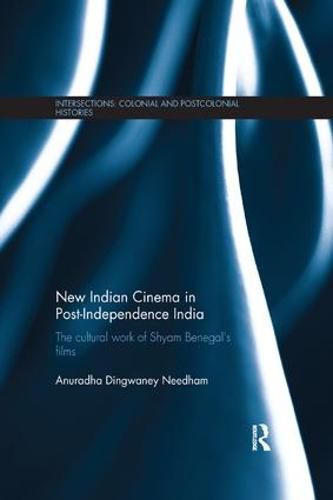Readings Newsletter
Become a Readings Member to make your shopping experience even easier.
Sign in or sign up for free!
You’re not far away from qualifying for FREE standard shipping within Australia
You’ve qualified for FREE standard shipping within Australia
The cart is loading…






Shyam Benegal is an Indian director and screenwriter whose work is considered central to New Indian cinema. By closely analysing several of Benegal’s films, this book provides an understanding of India’s post-independence history.
The book examines the filmmaker’s focus on women by highlighting his subtle and critical engagement with a truism of Indian nationalism: women’s centrality to the (nation-) state’s negotiation with modernity. It looks at the importance Benegal accords to history - its little known, contested, or iconic events and figures - in crafting national culture and identities, and goes on to discuss the filmmaker’s nuanced representation of the developmental agendas of the nation-state. The book presents an account of the relationship of historical film and fiction to official history, and provides a fuller understanding of Indian cinema, and how it is shaped by as well as itself shapes national imperatives.
Filling a gap in the literature, the book offers an analysis of cinematic treatment of post-independence narratives and gives important insights into the imagination of the time. It is a useful contribution for students and scholars of Film Studies, South Asian History and South Asian Culture.
$9.00 standard shipping within Australia
FREE standard shipping within Australia for orders over $100.00
Express & International shipping calculated at checkout
Shyam Benegal is an Indian director and screenwriter whose work is considered central to New Indian cinema. By closely analysing several of Benegal’s films, this book provides an understanding of India’s post-independence history.
The book examines the filmmaker’s focus on women by highlighting his subtle and critical engagement with a truism of Indian nationalism: women’s centrality to the (nation-) state’s negotiation with modernity. It looks at the importance Benegal accords to history - its little known, contested, or iconic events and figures - in crafting national culture and identities, and goes on to discuss the filmmaker’s nuanced representation of the developmental agendas of the nation-state. The book presents an account of the relationship of historical film and fiction to official history, and provides a fuller understanding of Indian cinema, and how it is shaped by as well as itself shapes national imperatives.
Filling a gap in the literature, the book offers an analysis of cinematic treatment of post-independence narratives and gives important insights into the imagination of the time. It is a useful contribution for students and scholars of Film Studies, South Asian History and South Asian Culture.